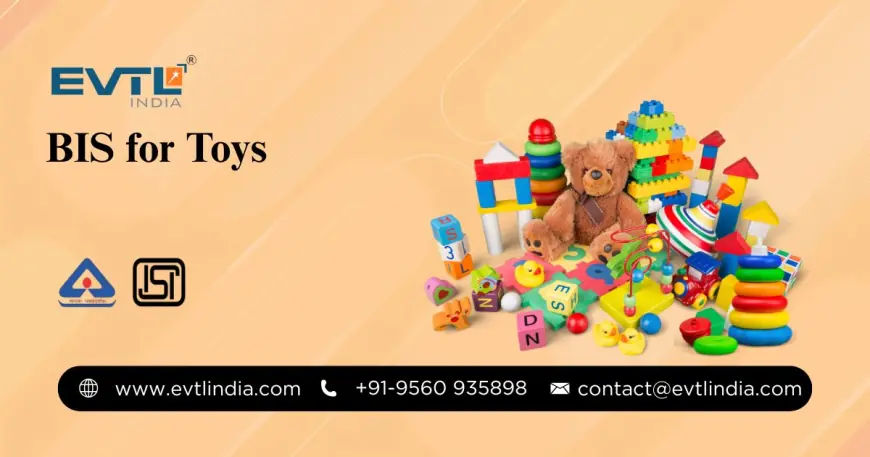How BIS Certification Is Protecting Your Child — The Truth Behind Safe Toys

When you hand your child a toy, you expect it to bring joy, spark creativity, and offer hours of safe play. But have you ever paused to wonder who ensures these toys are actually safe? Behind that colorful plastic figure or plush animal, there’s an invisible shield—BIS for Toys—that protects your child from potential harm.
Let’s unravel what this certification means, why it's important, and how manufacturers can stay compliant while offering safe and quality toys to the Indian market.
Why Toy Safety Is More Serious Than It Seems
It might surprise you, but toys can be dangerous when made with substandard materials. Small detachable parts, toxic paints, sharp edges, or even poor structural design can lead to serious injuries or health risks. To counter this, India took a proactive step in ensuring every toy sold in the market adheres to a defined safety standard.
And that’s where the Bureau of Indian Standards (BIS) steps in.
What Exactly Is BIS Certification for Toys?
Think of BIS certification for Toys as a quality stamp given by the Indian government. It confirms that a toy has passed rigorous tests related to mechanical safety, chemical composition, flammability, and hygiene. Under the Toys (Quality Control) Order notified by DPIIT, no toy—domestic or imported—can be sold in India without this certification.
This regulation isn’t just about ticking boxes. It’s about building trust between toy makers and parents, and most importantly, protecting children from unseen risks.
Let’s Break It Down — Who Needs This?
Any business that manufactures, imports, stores, or sells toys in India must comply. This includes:
-
Indian toy manufacturers
-
Foreign manufacturers exporting to India
-
Toy importers and wholesalers
Without the ISI Mark for Toys, selling is strictly prohibited. Authorities actively monitor marketplaces—both offline and online—to seize uncertified products.
ISI Certification for Toys: More Than Just a Label
The ISI Mark isn’t just a logo you slap on packaging. It’s a signal that a toy:
-
Has passed through BIS-approved labs
-
Is made with child-safe materials
-
Fulfills Indian standards (IS 9873 for non-electric toys and IS 15644 for electric toys)
-
Undergoes frequent inspection and audits
What does this mean for parents? Peace of mind.
What does it mean for businesses? Credibility, brand trust, and legal clearance.
The Journey to Certification: Not a One-Step Game
To achieve BIS certification, manufacturers must follow a set path:
-
Select the relevant standard – IS 9873 (Parts 1 to 7) and IS 15644.
-
Set up in-house testing facilities or tie up with BIS-recognized labs.
-
Apply for certification through the BIS portal.
-
Undergo factory inspection and product sample testing.
-
Wait for approval and receive the license number for the ISI mark.
It's a comprehensive but manageable process, especially with professional help.
Where a BIS Consultant for Toys Comes In
While the process is transparent, navigating BIS documentation, audit prep, and testing formalities can be time-consuming. That’s where working with a BIS consultant for toys becomes a smart business move.
An experienced consultant simplifies things by:
-
Identifying applicable standards
-
Managing the application process
-
Coordinating with BIS labs
-
Assisting with factory setup and compliance
-
Offering end-to-end support to secure your ISI mark
For toy brands that are entering the Indian market for the first time, hiring a consultant can mean the difference between swift approval and months of delays.
What If You Skip BIS?
Many small-scale or import-based sellers think they can "get away" without certification. Here's the reality check:
-
Your products can be seized or banned.
-
You may face heavy penalties or legal action.
-
E-commerce platforms may delist your toys.
-
You lose consumer trust—permanently.
In short, skipping BIS isn't just risky, it’s business suicide in today’s regulatory environment.
Domestic vs. Foreign Manufacturers — Same Rules Apply
Whether you’re a local manufacturer or an international toy brand shipping to India, BIS doesn’t play favorites. Foreign companies must either establish a liaison in India or appoint an authorized Indian representative to handle their certification.
The process may take 3–6 months depending on product complexity and documentation. But once you get the green light, the Indian toy market—valued at over $1.5 billion—is wide open.
Real-World Impact: Safer Childhoods
Here’s where things get real. Since mandatory BIS certification began, India has seen a measurable decline in injuries caused by faulty toys. Toxic lead levels in paints? Reduced. Choking hazards from small parts? Better regulated. Flammable materials? Banned.
Parents are now more aware and actively check for ISI marks while buying toys—online or in physical stores. And thanks to BIS enforcement drives, the market is cleaner than ever before.
Conclusion: BIS Is Not a Barrier—It’s a Bridge
EVTL India is one of the leading BIS Consultant in India, helping manufacturers obtain their BIS licences hassle-free. Many toy manufacturers see compliance as a burden. But the truth is, BIS for toys is a bridge to trust, safety, and global quality recognition.
Consumers today demand transparency. Certification shows that your brand values safety and is willing to invest in what matters—children’s well-being. Whether you're a startup launching wooden toys or an MNC importing electronic dolls, BIS is your gateway to sustainable success.
What's Your Reaction?
 Like
0
Like
0
 Dislike
0
Dislike
0
 Love
0
Love
0
 Funny
0
Funny
0
 Angry
0
Angry
0
 Sad
0
Sad
0
 Wow
0
Wow
0
















































